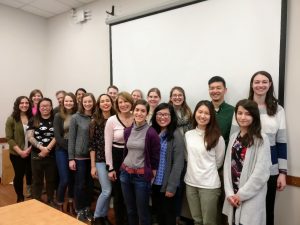
Contributed by JoAnn Chen, Monika Satkauskas, and Mireille Ghoussoub
During a lunch break on 11 April 2019, Dr. Mona Nemer, Canada’s Chief Science Advisor (CSA), sat down with graduate students in Lash Miller, and engaged in a conversation that spanned from her own experience leading a cardiac biology research group at the University of Ottawa (UOttawa) to the political ecosystem required for a culture of science.
A recurring theme stressed by Dr. Nemer was the indispensability of rigorous scientific training to keep Canada on course as a competitive global leader. To become a nation that relies more on sustainable solutions, and less on limited natural resources, Canada must be able to retain high-trained people. A key ingredient is a shift in priorities of Canadians, which could encourage greater investment from the private sector, and enhance collaborative work amongst the private sector, government (provincial and federal) and academia.
A significant barrier, however, lies in the absence of ongoing dialogue between scientists and non-scientists among all generations. Dr. Nemer believes that creating and maintaining this dialogue should be a continuous non-partisan project.
Scientists also need to learn how to share science without intimidating jargon. A significant disconnect remains between scientists and policy-makers who are usually equipped with degrees in political science or international relations. Scientists, especially those trained through a PhD program, should be active in policy-making. If the overall goal is to reach non-scientists, make the effort to start a relationship – invite politicians to labs, explain the research as often as possible, go to the target audience (e.g. Science Meets Parliament). Dr. Nemer reminded us that when trying to communicate science to the general public, the small seemingly inconsequential details could be vital to the success of your efforts. For example, the choice of venue is critical. The audience will be different if the event is hosted in a university classroom compared to a public library. By inviting the general public to educational events such as these, they will gain science literacy. Science literacy has real-life benefits: the ability to understand food labels, a doctor’s diagnosis, etc.
How can students’ voices be heard? Dr. Nemer notes that the upcoming generation of researchers is better prepared to navigate different sectors and cultures than previous ones, and that graduate students should rest assured as politicians and CEOs are seeking scientific talent. Dr. Nemer also reminded those present to not overplan their careers, pointing out that holding a tunnel-vision view of one’s life trajectory can actually lead to missed opportunities. She herself did not anticipate ever working with politicians when she launched her research career.
As a chemistry doctoral student at McGill University, Dr. Nemer did not envision that she would go on to work with politicians representing Canada’s research community at a national level. Her hobby was playing bridge, and her leadership roles included organising the annual Christmas party and increasing washroom access for females. Since being appointed the Vice President of Research at UOttawa, she began to interact with the public sector on a regular basis. As her roles outside of her research lab has expanded, she admits that managing both her roles as a Principal Investigator (PI) and the CSA requires compromise, but she still ensures she makes time for her students’ requests. Her role as a PI is crucial in staying connected to research, in providing credibility with colleagues, and to keep a perspective on policies from the user-end. She encouraged those overwhelmed by various responsibilities to “build a strong team around you and delegate” in addition to “do(ing) the things that matter.”
